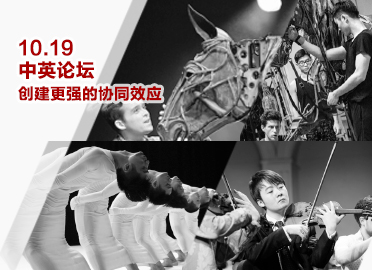Sino-UK Performing Arts Industry and Education Forum: Creating Stronger Synergies

Time: Oct. 19th-20th, 2015
Location: L1 Diamond Hall, L2 Carol Hall1-2-3, Intercontinental Hotel Shanghai Puxi
The 2015 Forum supports the Sino-UK Year of Cultural Exchange. The 2015 Forum will focus on creating stronger performing arts synergies between China and the UK. The 2015 Forum will examine ways in which Sino-UK collaboration can be improved - not just in terms of more collaboration, but, importantly, in terms of higher quality engagement, and more sustainable collaboration.
The Sino-UK Performing Arts Industry and Education Forum brings together representatives from the performing arts industry, education and government bodies in China and the UK. The Forum has four key objectives: to build on existing strong performing arts links between the UK and China; to further improve industry and education collaboration; to explore ways of ‘growing’ new audiences; to consider the influence of performing arts on national and international cultural development.
The first Sino-UK forum in performing arts was held in 2009 – with a focus on musical theatre In 2014 a group of national arts organisation leaders in China and the UK agreed to take the initial lead in steering future fora and contributing to the 2015 Forum. It has been agreed that the 2015 Forum should be convened on 19 October 2015 at the China, Shanghai International Arts Festival.
The Forum is committed: to respecting the cultural values of both countries; to adding value to existing collaboration to support high quality deliverables in the performing arts; to sharing good practice in performing arts collaboration; to building on current knowledge and be forward-looking in order to support longer term and more sustainable collaboration models/examples; to challenging and stretching not only those who attend the fora, but also current and future thinking regarding the role of the performing arts in strengthening international collaboration and understanding.
SESSION 1: PLENARY: Where are we now?
What is the current position? What are the current strengths, weaknesses, opportunities and threats of Sino-UK Collaboration?
Keynote Speakers:
▪Sir Nicholas Kenyon, Managing Director, The Barbican Centre, London
▪Mr Zhang Zhe, CEO and President, Shanghai Grand Theatre Arts Centre
SESSION 2: PLENARY: Case Studies
What have we learned from the case studies of existing Sino-UK collaborations?
The 2015 Forum will learn from a number of case studies of current Sino-UK performing arts collaboration. Key Chinese and British partners have agreed to undertake a ‘self-review’ of their collaboration and are willing to share their experience with others at the 2015 Forum.
As part of this self-review both collaborating partners will be asked to carry out a SWOT analysis, from which lessons will be shared at the Forum to further and deepen our understanding of what makes good performing arts collaboration. The case studies will cover a range of performing arts activities, such as co-productions, training and co-development work for opera, dance and theatre; as well as performing arts education, learning and participation and translation initiatives.
In this session we will employ the SWOT method to analyze the seven case studies below:
CHINA UK
1.National Theatre, China National Theatre of Great Britain
2.Shanghai Grand Theatre Guildhall School of Music and Drama
3.Ping Pong Productions/ Agent for TAO Dance Theatre Sadler’s Wells
4.Tianjin People’s Art Theatre National Theatre of Scotland
5.Shanghai Concert Hall Southbank Centre
6.National Centre for the Performing Arts Royal Opera House
7.Scottish Opera/Confucius Institutes of Scotland – Learning and Participation Initiative – Chinese Language and Culture
8.Royal Shakespeare Company: long-term China-UK strategy, including theatrically viable, actor-friendly, audience accessible translations of Shakespeare’s plays and Chinese Classics
SESSION 3: SMALL GROUP WORK
FOCUS: Where are we going? What will prevent us from getting thereachieving the goal? How do we know if we have been successful?
Participants will be divided into three groups, each consisting of fifteen people. The discussions will be led by one Chinese and one British participants in each group.
Three Groups (see Group Lists) will work on focused questions and tasks related to Forum key questions (see detailed questions and tasks for small group work)
The outcomes from the pilot case studies, review of residences and other workshops will be discussed at the 2015 Forum. From the discussions undertaken during the 2014 planning meetings that took place in China and the UK - the following key themes for enquiry have emerged so far, and will form the focus of the 2015 forum:
1.Sustaining high quality and innovation are fundamental to a vibrant, diverse and flourishing performing arts sector – how can this be ensured in future?
2.What business and entrepreneur models work well and how can they be improved - including effective ticketing policies and strategies? The funding challenge is increasingly a constraint to new developments in both countries. What have we learned from mixed economy approaches (box office, local and central government and philanthropy) that can inform future policy and practice, and fund-raising generally?
3.What more can we do to generate new audiences, maintain the support of existing audiences, and find innovative ways to reach out to audiences outside of our art centres?
4.What skills, capacity and capabilities are needed to design and manage new arts centres effectively and efficiently?
5.Are we maximising the use of technology and opportunities for cross-discipline work in supporting performing arts and in cultivating and engaging new audiences?
6.How can we encourage the creation of new high quality content and also respect and redefine classical forms?
